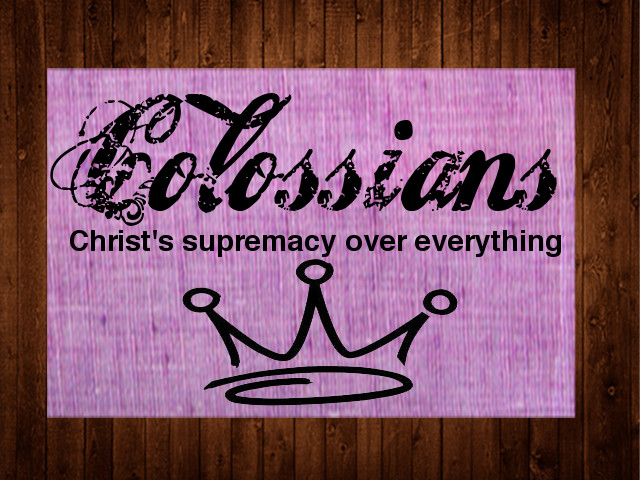
A Prayer for the Church (Col. 1:3–8)
Introduction
- Why Colossians?
- Christ’s supremacy in a pluralistic and utilitarian setting (prized tolerance).
- Correction of false teaching (legalistic, moralistic).
- We are just as syncretistic as they were.
- Typical American: gods of health and prosperity
- Ancient Greek: polytheism
- The only crime today is intolerance, which has led to the acceptance of false teachers and false teaching. The average Christian can’t distinguish between Orthodoxy and heresy. (College Prof said “Who defines Orthodoxy anyways?” Average pastor simply isn’t teaching with depth.)
- Last week we looked at 1:1–2. Author, Recipients, Benediction.
- In 1:3–8, Paul enters into a section of thanksgiving and prayer.Pray & Read Col. 1:3–8
- Thanksgiving informs his prayer, which leads to an encouragement to be “giving thanks”.
- More than a sense of duty. Paul heard about them and immediately added them to his prayer list.
- Paul never even met the Colossians.
- The growth of the gospel in Colossae, and around the world, is why Paul is constantly thankful and continually prayerful.Paul provides three aspects of the gospel: 1. The Effects of the Gospel, 2. The Fruit of the Gospel, and 3. The Agent of the Gospel.
1. The Effects of the Gospel (vv.3–5)
- v.3 Frequency and regularity to his prayers.
- vv.4–5 Triad of faith, love, and hope exemplified in the Colossian church. Paul thanks God for giving these qualities to the Colossians.
- However, it is still a personal faith, love, and hope. We are still responsible even though God makes it possible.
- Now let’s briefly consider each of these terms:
- Faith is a gift from God (Eph. 2:8–9).
- If you have it, thank God for it.
- If you don’t have it, repent and seek mercy that you might receive it.
- vv.5–6 They received faith when they “heard and understood” the gospel (Not prayed a prayer or followed a specific formula).
- I too “prayed a prayer” when I was younger (several times!).
- Do you remember the joyful occasion when you first believed?
- It’s good to remember and reflect upon the joy of your salvation often.
- Love Paul typically regarding human love for one another. However, the sacrificial death of Christ is the definitive expression of this “love”.
- Most people view “love” as an emotion that comes and goes in such a way that it is largely out of our control.
- But true biblical love = sacrificial service to those in need.
- Hope This is the only time were Paul stresses hope as the basis for love and faith.
- Possibly emphasizing b/c of the false teachers.
- Possibly the Colossians had doubts about the gospel or questions regarding their future. Not enough information.
- Probably safe to assume their need to be reminded of the surety of God’s promises.
- Hope is an expression of confidence, not wishful thinking.
- It is “laid up for you in heaven” (stored up/reserved).
- Misplaced hope will always disappoint! Whether that hope is placed in a perfect marriage, or a successful career, or an exceptional child.
- Hope that does not result in faith and love is a sign that it has been misplaced.
- C.S. Lewis, “Indeed, if we consider the unblushing promises of reward and the staggering nature of the rewards promised in the Gospels, it would seem that our Lord finds our desires, not too strong, but too weak.”
- What would change if we really understood what awaited us in eternity? Our faith in Christ would increase and our love for all the saints would be seen.
2. The Fruit of the Gospel (v.6)
- v.6 It is a reference to the continuing progress of the gospel (both geographically and personally – in maturity).
- The gospel’s power is its ‘universality and effectiveness.’
- You’ve heard this language before haven’t you? “Be fruitful and multiply.” Paul is taking the reader back to the creation mandate.
- God’s intention to bless the whole world through his people is now being realized as the gospel bears fruit and grows.
- When “truth” is undermined, evangelism and mission suffer. Pannenberg, “For many today, the missionary enterprise is a matter of imposing our personal preferences and culturally conditioned prejudices upon others, and is therefore not only illegitimate but morally offensive.”
3. The Agent of the Gospel (vv.7–8)
- vv.7–8 Cultural prejudice did not prevent Epaphras from going to Colossae.
- “As you learned” may imply discipleship.
- Fulfilling the great commission requires more than a single evangelistic encounter.
- The gospel must be heard, it must be understood, and it also must be learned in an ongoing sense.
Conclusion
- Big Idea: When the gospel branches out, thanksgiving takes root.
- As we look forward to launching a new church in Clovis, we have the opportunity to put this very word into practice. As we see the gospel branching out into new neighborhoods and growing in the hearts of others, our response will be to give thanks to God and to be in continual prayer that we would see increasing growth.
Related



0 Comments